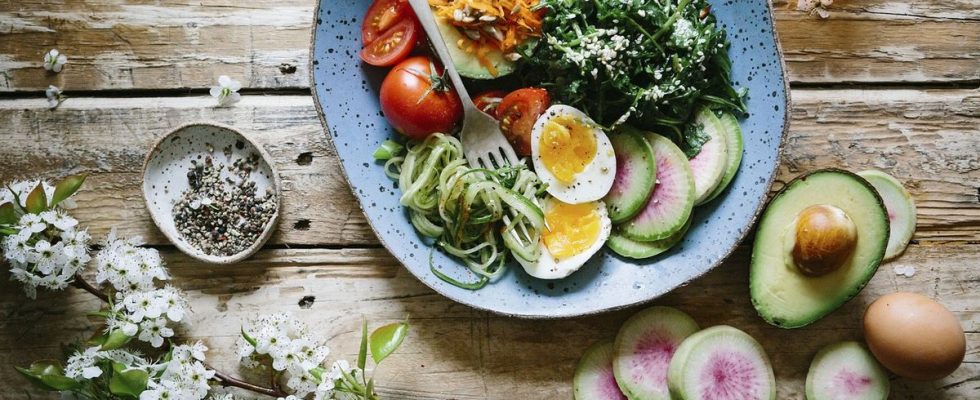It’s sunny, it’s hot, so we want to eat fresh. With a thermometer flirting with 30°C this week, the raclette machine has officially bowed out until next winter. In this sunny month of June, the salad season is on.
Greek, Nice or Caprese: raw vegetables take pride of place on the plate. Rich in water and vitamins, on paper, they are all good. But if raw vegetables are good for your health, why do we often hear that it is not recommended to eat them in the evening? Is it true ? And if so, why ?
Necessary but irritating fiber
Compared to a burger and fries, there is obviously no comparison. “In terms of nutritional interest, raw vegetables are very virtuous: they are rich in water, vitamins and minerals, and in fibre, essential for regulating intestinal transit, explains Raphaël Gruman, nutritionist and co-author of the book. I treat myself with mesonutrients (ed. Leduc). But it is true that the fibers of raw vegetables are harder to digest, they are more likely to ferment in the colon, and thus generate gas, bloating and discomfort at the end of the day.
For what ? “At the end of the day, our body has already started a digestive process for the previous meals, so we are more likely to suffer from bloating in the evening, especially people who have a sensitive intestine,” says Marie-Laure André, dietician nutritionist and author of the blog Passion nutrition. “We tend to have a slightly lazier transit at the end of the day, adds Raphaël Gruman. This is why we always recommend eating raw vegetables for lunch, they will be digested better. And to promote easily digestible evening meals, to prevent sleep from being disturbed.
Cold vegetables, but cooked or crushed
Does this signal the end of salads for dinner? No. “The first thing is to know yourself well, to know which foods you digest badly and in what quantities, and thus know your tolerance threshold, underlines Marie-Laure André. Some people have trouble digesting raw peppers, others cucumbers, or legumes added to their plate of raw vegetables”. Similarly, “if you are a little weak on gluten and you combine pasta and raw vegetables, you have a combo that will ferment in the intestines and give gas and bloating”, specifies Raphaël Gruman.
One of the solutions for still eating cold vegetables at dinner is to “go for vegetables that are cooked but eaten cold,” he advises. You can eat green beans in salads, very rich in fiber softened by cooking”. But also beets, with antioxidant and anti-inflammatory properties, or even asparagus, armored with antioxidants that help fight against cell aging and prevent cardiovascular disease. Salads to which “flax seeds, pine nuts or almonds can be added to give texture and provide good fats, continues the nutritionist. They can also be eaten in cold soup, gazpacho for example: grinding the raw vegetable will help break down the fibres. On the other hand, we will avoid what is spicy: this can create irritation in the intestine. And all that is raw garlic, onion and shallot, which ferment in the intestines and increase bloating”. But also “cruciferous vegetables such as raw red or white cabbage, with irritating fibers”, insists Marie-Laure André.
Improve the digestibility of your salad
And if you are really addicted to salad for dinner, how to improve its digestibility? “Some vegetables will be more digestible if they are peeled and drained, like cucumbers and leeks, recommends Raphaël Gruman. This is also the case with tomatoes and peppers, whose skin is indigestible. You can immerse the first ones for a few seconds in boiling water, and grill the second ones in the oven and put in an airtight box for a few minutes, the skin will come off more easily”. We can also “think of lactofermented vegetables like kimchi, suggests Marie-Laure André. The lactofermentation process releases enzymes in the vegetables that will aid their digestion.”
And unlike other vegetables with irritating fibers, you can have fun in the evening by eating avocado. “It’s an oilseed that contains soft fibers, it will not have a bloating effect and it will even make transit more fluid, assures Raphaël Gruman”.
“Digestion starts in the mouth”
In addition to the contents of his plate, “digestion starts in the mouth”, notes Marie-Laure André. So “it is very important to chew well, to grind the fibers”, insist the two nutritionists.
But we are not all equal in the face of raw vegetables and the associated bloating. “Digestive comfort depends on the quality of each person’s microbiota,” explains Raphaël Gruman. Those who have a good one will digest raw vegetables more easily. So, if necessary, taking a course of probiotics from time to time can be interesting to reinforce it”.

